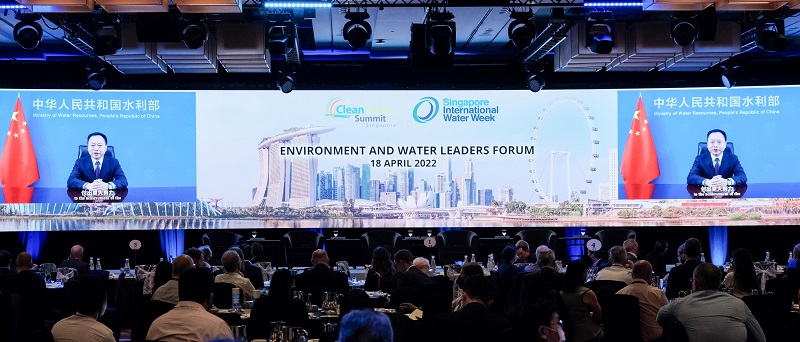
On April 18, H.E.Mr. Li Guoying, Minister of Water Resources, attended the 2022 Singapore International Water Week via video and delivered a speech at the Environment and Water Leaders Forum. With the theme of “Towards a Climate-Resilient Future, Transform Challenges into Opportunities”, the Forum facilitated discussions and exchanges regarding the latest initiatives and actions of the water and related sectors in response to climate change.
Minister Li pointed out that the adverse impacts of global climate change are increasingly apparent and it is a grave challenge to human society. In recent years, due to the impact of global climate change, China has witnessed many extreme weather events. Flood and drought disasters tend to be more abrupt, abnormal and uncertain, posing a serious threat to people’s lives, food security, ecological integrity and infrastructure security.
Minister Li noted that water sector in China has earnestly practiced President Xi Jinping’s water governance philosophy of prioritizing water conservation, balancing spatial distribution, taking systematic approaches and giving full play to the roles of both government and market. The disaster prevention, mitigation and relief methodology of “2 Insists and 3 Shifts” was also fully implemented. Besides, effective measures were carried out to tackle the challenges of floods and droughts under the impact of climate change, thus enhancing water security for economic and social development. Firstly, endeavors were made to speed up the construction of flood control engineering system in river basins, strengthen the coordinated regulation of flood control and drought relief in river basins, and vigorously improve the capacities of flood and drought control and prevention. Secondly, efforts were made to optimize the spatial allocation of water resources, implement major projects of the national water network, and constantly enhance the capacity for balanced allocation of water resources and water supply. Thirdly, actions were taken to fully practice the National Action Plan for Water Conservation, strengthen the role of water resources as a rigid constraint, reinforce the ecological and environmental protection and governance of rivers and lakes, and enhance the comprehensive control of water and soil erosion. Fourthly, attempts were made to accelerate the development of digital-twin projects for river basins and water projects with the functions of forecasting, early warning, rehearsing and emergency planing, support scientific and accurate decision-making, and realize the shift from passive response to proactive prevention and control in the management of water security risks.
Minister Li highlighted that addressing climate change is the shared responsibility of all mankind and calls for global solidarity and cooperation. For a long time, water sector in China has engaged itself in international cooperation on resilience against flood and drought disasters in the context of climate change. In the forthcoming future, aiming at making greater endeavors and more contributions to sustainable development goals, China stands ready to join hands with the international partners, boosting coordination and cooperation, sharing successful water governance practices and technologies, and improving the capacities of flood and drought control and prevention.
Government and business leaders from Singapore, the United Arab Emirates, the Netherlands, Belgium and many other countries, as well as heads of relevant international organizations and large multinational companies participated in the Forum. The Forum participants exchanged and shared perspectives and experience around the theme of adaptation to climate change. A broad consensus was reached that climate change is an urgent challenge for the world, and water represents a pivotal resource in dealing with climate change and achieving sustainable development. The international community should gear up cooperation, jointly address the environmental and water problems in the context of climate change, and speed up the progress of water related goals of the UN 2030 Agenda for Sustainable Development.
Founded by the Singapore government in 2008 and convened every two years since then, Singapore International Water Week is currently one of the largest and most influential international water events.
Note: “2 insists” consist of putting prevention first and combining disaster prevention and relief, and unifying normal disaster reduction and abnormal disaster relief. “3 shifts” include transforming from post disaster relief to pre-disaster prevention, from single disaster response to comprehensive disaster mitigation, and from loss reduction to risk reduction.